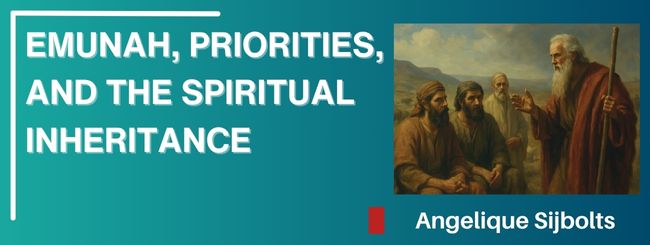בס”ד
A THOUGHT ABOUT PARSHAT MATOT-MASEI 5785
Based on Numbers 32:1–7 With insights from Haamek Davar, Rabbi Mordechai Broyer, and contemporary reflection.
The Biblical Story (Numbers 32:1–7)
Now the sons of Reuben and the sons of Gad had very great livestock. They saw the land of Jazer and the land of Gilead, and behold, the place was a place for livestock.
So the sons of Gad and the sons of Reuben came and spoke to Moses and to Eleazar the priest and to the leaders of the congregation, saying:
“The land which the L-rd struck down before the congregation of Israel is a land for livestock, and your servants have livestock.”
They said, “If we have found favor in your sight, let this land be given to your servants as a possession; do not take us across the Jordan.”
But Moses said to the sons of Gad and to the sons of Reuben, “Shall your brothers go to war while you yourselves sit here?
Now why are you discouraging the sons of Israel from crossing over into the land which the L-rd has given them?”
The Request of Reuben and Gad
The tribes of Gad and Reuben, who owned large herds of livestock, noticed that the land east of the Jordan — near Jazer and Gilead — was ideal for their animals. So they approached Moses with a request:
“Let us stay here and inherit this land, instead of crossing into the Promised Land.”
Moses’ Sharp Response
Moses reacts strongly.
He accuses them of abandoning their brothers on the eve of conquest. More than that, he reminds them of a painful history:
When their ancestors lacked faith and refused to enter the land, G-d’s anger was kindled.
Moses’ reaction, when seen in light of everything he had gone through with the people, is completely understandable. This moment isn’t primarily about geography — it’s about the weight of history, of broken hopes, and of a leader’s deep connection to his mission.
Their Clarification
The tribes respond respectfully:
They will indeed build homes and animal corrals on this land — but first, they pledge to join their brothers in battle, not returning home until all the tribes have received their inheritance.
Moses agrees — if they keep their promise. Though the land east of the Jordan was not part of the original Promised Land, it would be given to them as a conditional inheritance.
Commentaries: What’s Really Going On?
Haamek Davar: Fear Disguised as Practicality
The Haamek Davar suggests their true motivation may not have been livestock at all.
Perhaps they feared war, or even feared living so close to G-d’s presence in the holy land. Their reasoning, then, was cloaked in practical concerns — but rooted in a lack of emunah.
Moses feared this could set a dangerous precedent — and in fact, it already had. The episode with the spies had shown what a lack of faith could lead to: despair, rebellion, and exile.
But Wait—Hadn’t They Seen G-d’s Miracles?
These tribes had grown up surrounded by the supernatural:
- Manna from heaven
- Water from the rock
- The Cloud of Glory
So how could they still lack faith?
Rabbi Mordechai Broyer’s Insight:
“Miracles do not bring one to emunah. Rather, emunah prepares the heart to see the miracles.”
What Does That Mean?
1. Emunah is a Heart Posture
Faith is not a result of what you see — it’s a spiritual lens you already carry within. It opens the heart to perceive G-d’s hand.
2. Miracles Can Go Unnoticed
Without faith, even great wonders can be dismissed as coincidence or human effort.
3. Faith Makes You Receptive
When you trust, you become sensitive to G-d’s presence — in both the miraculous and the mundane.
4. Miracle-Based Faith Is Fragile
If your belief depends on visible miracles, what happens when no miracle comes?
Application for Today — Even for Noahides
For Noahides — righteous among the nations — there is no literal Promised Land like Eretz Yisrael.
But there is a spiritual inheritance: a divine role in creating a just and G-dly world.
Their “Canaan” is not a place on the map, but a mission: to live by the Seven Laws of Noah, and to walk with reverence and integrity before the Creator.
The mistake of Gad and Reuben, then, is a message to all of us:
- Do we settle for comfort on the sidelines?
- Or do we trust Hashem enough to step into our higher purpose, even when it’s difficult?
A Recent Parallel
When Iran launched its unprecedented attack on Israel, few believed the outcome could be favorable. And yet — through a chain of defense systems, human courage, and yes, unseen help — the threat was repelled.
Was it just technology? Was it pure luck?
To one without emunah — perhaps.
But those who believe will recognize: this, too, was a miracle.
And they will say,:
| 23 This is the L-RD’S doing; it is marvellous in our eyes. | כג מֵאֵת ד’, הָיְתָה זֹּאת; הִיא נִפְלָאת בְּעֵינֵינוּ. |
By Angelique Sijbolts
With thanks to Rabbi Tuvia Serber for the feedback
Sources:
Psalm 118:23
Torah: Numbers 32:1–7
Haamek Davar on Numbers 32:7
Rabbi Mordechai Broyer, commentary on faith and miracles
Midrash and Rashi on the role of fear and leadership
© Copyright, all rights reserved. If you enjoyed this article, we encourage you to distribute it further.
Our blogs may contain text/quotes/references/links that include copyright material of Mechon-Mamre.org, Aish.com, Sefaria.org, Chabad.org, and/or AskNoah.org, which we use in accordance with their policies.
